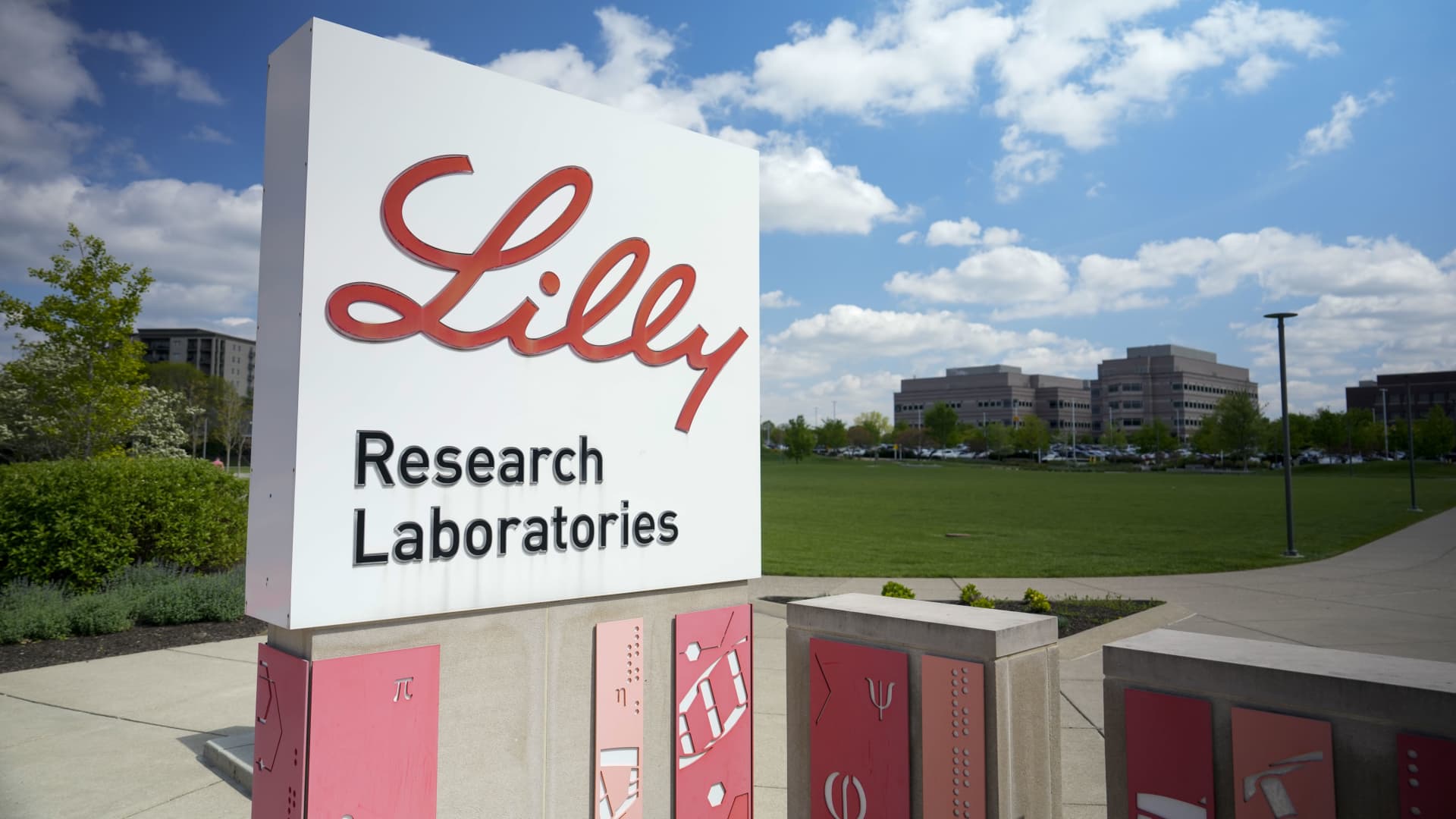Pfizer (PFE) has suffered another setback in its efforts to develop a weight-loss pill — and that’s good news for Club holding Eli Lilly (LLY) as it looks to maintain an edge in the fast-growing obesity-treatment market. Pfizer said Friday it will discontinue its twice-daily weight-loss pill, danuglipron, after patients in a mid-stage trial experienced high rates of side effects like nausea and vomiting. More than 50% of recipients stopped taking the drug all together, the company said. Pfizer said it will focus future development of danuglipron on a once-daily version of the drug. In June, the New York-based pharmaceutical giant stopped developing a different obesity pill, known as lotiglipron , due to concerns about liver safety. Shares of Pfizer tumbled nearly 5% Friday, to around $29 each. Meanwhile, Eli Lilly shares were mainly flat in afternoon trading, at around $591apiece. “I don’t think this should be going down,” Jim Cramer said Friday, referring to Eli Lilly stock. For the year, shares of Eli Lilly have soared more than 60% — significantly outperforming the S & P 500 — largely tied to optimism around its obesity-treatment pipeline. We lifted our Eli Lilly price target Friday to $630 per share, up from $600. LLY .SPX YTD mountain Eli Lilly’s stock performance in 2023 compared with the S & P 500. Eli Lilly and Danish rival Novo Nordisk (NVO) are the two dominant players in the obesity market. Pharmaceutical analysts widely expect both companies to continue to dominate in the medium term, despite competition from other drugmakers such as Pfizer, Amgen (AMGN) and AstraZeneca (AZN). Pfizer’s latest setback “could further widen Lilly and Novo’s leads,” Bank of America analysts said in a note to clients Friday — a view we share. As Jim argued in November after AstraZeneca bought the rights to an experimental obesity pill from a Chinese biotechnology firm, Eli Lilly — and Novo Nordisk, for that matter — has an incumbency advantage. The longer it takes for competitors to get to this burgeoning market, the more revenue first-movers Eli Lilly and Novo Nordisk can capture. Our preference for owning Eli Lilly over Novo Nordisk comes down to Eli Lilly’s broader drug pipeline, including its Alzheimer’s treatment donanemab that’s awaiting U.S. regulatory clearance. Right now, the leading weight-loss drugs — Novo’s Wegovy and Lilly’s recently approved Zepbound — are injectable. Wegovy and Zepbound are in an emergent class of drugs known as GLP-1s, which mimic a hormone in the gut to assist in blood sugar control and effectively suppresses appetite, helping contribute to weight loss. Novo’s Ozempic and Lilly’s Mounjaro are GLP-1s used to treat type-2 diabetes. Drugmakers and analysts alike see oral treatments playing an important part in a GLP-1 market that some Wall Street firms project will eventually generate at least $100 billion in annual revenue. The thinking is that daily obesity pills will appeal to more people than a once-weekly injection, even if the pills lead to less weight loss. Pills are also easier to manufacture than injectable GLP-1s. Eli Lilly has advanced its leading oral GLP-1, known as orforglipron, to large-scale phase-three studies after releasing impressive phase-two trial results in June . The large-scale studies are expected to be completed in 2025, according to the U.S. National Library of Medicine. In the mid-stage trial, patients who took the highest dose of orforglipron on average lost nearly 15% of their body weight. Between 10% and 17% of patients on the once-daily drug stopped taking it due to side effects, much lower than Pfizer’s more-than-50% discontinuation rate for twice-daily danuglipron. Novo Nordisk’s leading obesity pill — semaglutide, which is the same active ingredient in Wegovy and Ozempic — is a bit further along than Lilly’s. The company has said it expects to apply for approval from the U.S. Food and Drug Administration by year-end. In a late-stage trial , overweight adults who took the oral version of semaglutide lost up to 15% of their body weight over a 68-week period. (Jim Cramer’s Charitable Trust is long LLY. See here for a full list of the stocks.) As a subscriber to the CNBC Investing Club with Jim Cramer, you will receive a trade alert before Jim makes a trade. Jim waits 45 minutes after sending a trade alert before buying or selling a stock in his charitable trust’s portfolio. If Jim has talked about a stock on CNBC TV, he waits 72 hours after issuing the trade alert before executing the trade. THE ABOVE INVESTING CLUB INFORMATION IS SUBJECT TO OUR TERMS AND CONDITIONS AND PRIVACY POLICY , TOGETHER WITH OUR DISCLAIMER . NO FIDUCIARY OBLIGATION OR DUTY EXISTS, OR IS CREATED, BY VIRTUE OF YOUR RECEIPT OF ANY INFORMATION PROVIDED IN CONNECTION WITH THE INVESTING CLUB. NO SPECIFIC OUTCOME OR PROFIT IS GUARANTEED.
Pfizer (PFE) has suffered another setback in its efforts to develop a weight-loss pill — and that’s good news for Club holding Eli Lilly (LLY) as it looks to maintain an edge in the fast-growing obesity-treatment market.
